In simple terms, we’ve advocated for a path to prosperity. That path is built from policies that favor capitalism, free enterprise, robust competition and consumer choice. We do not believe there is another path that leads to durable prosperity, including the path that requires government to involve itself heavily in the orchestration of the economy.
At the end of October, the Fraser Institute, a leading think tank and research institution, published the "Economic Freedom Report for North America." The report measures the degree to which the policies and institutions of states and countries are supportive of economic freedom. The cornerstones of economic freedom are personal choice, voluntary exchange, freedom to enter markets and compete, and security of the person and privately owned property. Forty-two data points are used to construct a summary index and to measure the degree of economic freedom. This report has been published every year since 1986 and is regarded globally as one of the most robust and reliable measurements of economic freedom. Mississippi again ranked in the bottom quartile this year. Among the other states joining Mississippi in that quartile were California, Oregon, Minnesota, New York and Vermont.
Mississippians have very little in common with any of these states. These states are not geographically, politically, historically, or culturally similar to the Magnolia State. In fact, about the only thing Mississippi has in common with these states is its lack of economic freedom.
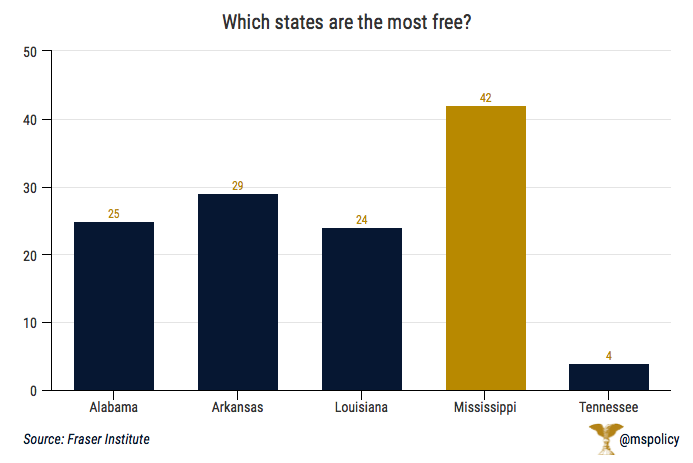
When we looked at the Fraser Index, which ranked Mississippi at #42 in 2018, we also noted that none of our neighbors were ranked as poorly. In fact, the average ranking for our contiguous neighbor states was #21 and no state ranked higher than #29. If you look to the 11 states making up the Southeast, from Virginia to Texas, the average ranking was 17.
Despite our advocacy for policies based on economic freedom, there remain leaders in Mississippi who seem unconvinced. There remain advocates for more and more reliance on the public sector. Many claim Mississippi is uniquely inoculated from experiencing economic growth and poverty reduction through the free market. Some even claim our lack of economic growth and poverty reduction is irrecoverably tied to our history or our geography. If only there was an example of a state that previously had similar economic freedom scores but embraced economic freedom polices over time and significantly improved the lives of its citizens as a result. If only we had data over the past twenty years than could show us how poverty can be reduced and per capita income can be increased in a state like Mississippi when freedom is the central public policy. Rather than one state, we’ve identified two states than serve as shining examples.
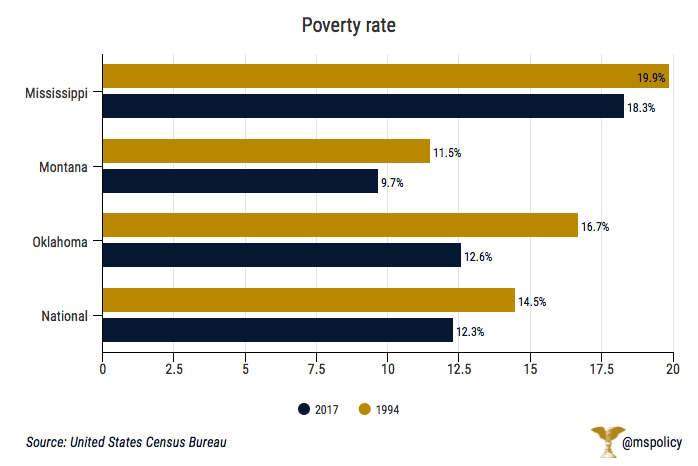
Let’s start by looking at the national poverty rate. In 1994, the rate was 14.5%. Today, the national average is 12.3%, a 15% reduction. In Mississippi in 1994, the poverty rate was 19.9%. Today, the rate is 18.3%, an 8% reduction. In Oklahoma in 1994, the poverty rate was 16.7%. Today, the rate is 12.6%, a 25% reduction. In Montana in 1994, the poverty rate was 11.5%. Today, the rate is 9.7%, a 16% reduction.
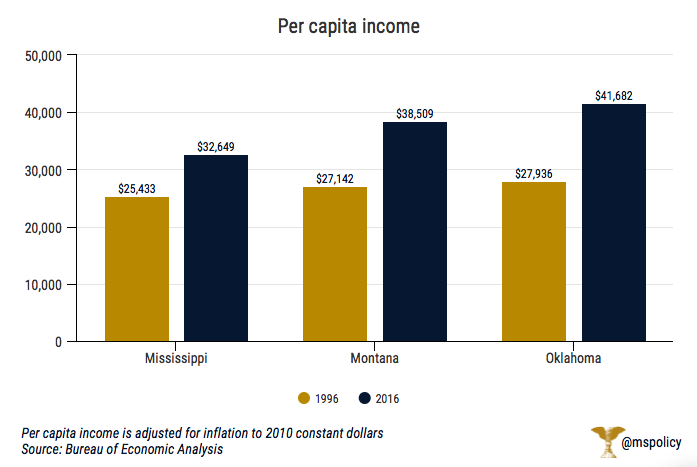
Next, let’s look at per capita income for the three states over a 20-year period. In 1996, the average income in all three states was very similar. In Mississippi, the average income was $25,433 (48thin the nation). Montana had an average income of $27,142 (46th) and Oklahoma $27,936 (45th). Twenty years later, Oklahoma had risen to 28thwith an average income of $41,682. Montana had risen to 38thwith an average income of $38,509. Over that same 20-year period, Mississippi slipped two sports to 50thplace with an average income of $32,649.
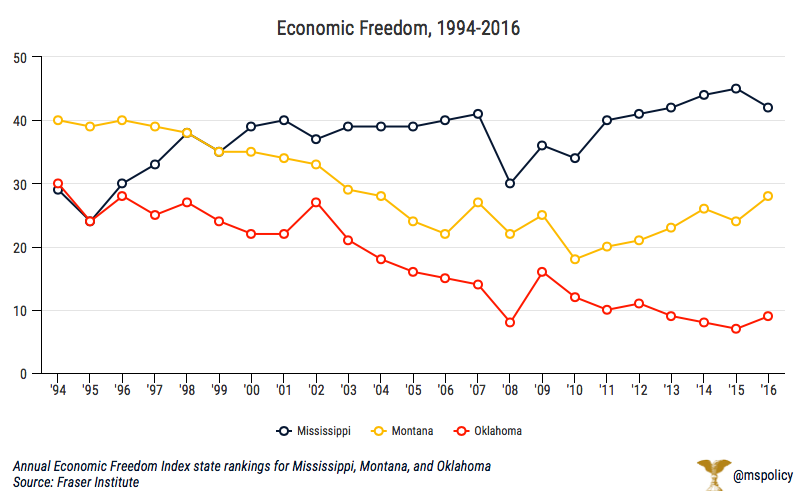
If we go back to the Fraser Institute Economic Freedom Index and plot how each of the three states performed in the same years (1994 to 2016), we see the strong correlation between economic freedom and prosperity. It is stark visual evidence of the power of choosing economic freedom. In 1994, Mississippi was ranked slightly more economically free than Oklahoma and considerably more so than Montana. Over the ensuing 22 years, Mississippi moved steadily away from economic freedom and the results are evident.
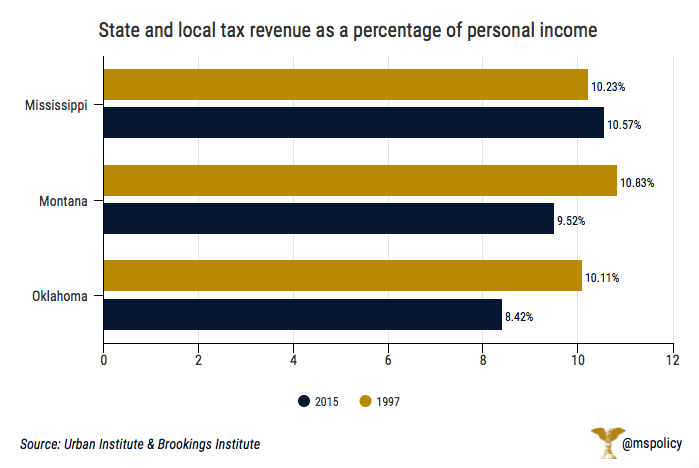
There is another valuable set of data that helps demonstrate the policy point as we compare Mississippi, Oklahoma and Montana. The Tax Policy Center, a joint project of the Urban Center and the Brookings Institute, publishes a report on state and local tax revenue as a percentage of personal income in each state. From 1997 to 2015, the tax burden in Oklahoma fell from 10.11 to 8.42. In Montana, the burden was reduced from 10.83 to 9.52. In Mississippi, the tax burden increased from 10.23 to 10.57. No other state in the Southeast had a burden at or above 10.0. At 10.57, Mississippi finds itself once again in the company of states like California, New York, New Jersey, Minnesota and Illinois.
What is the data and evidence telling us? It is informing us to choose capitalism and free markets. It’s telling us to move away from a “command and control” economic system and start relying more on individual freedom, consumer choice, and private competition. It’s telling us to allocate more resources towards free enterprise and fewer resources towards the political process. If we can start to get Mississippi’s economy growing by adopting policies that prioritize economic liberty, we can experience prosperity.
When states grow, other measures of quality of life are improved. Educational outcomes improve. Crime rates go down. Health measures improve and life expectancy expands. Montana and Oklahoma are real-life examples of how lives can be measurable improved when states make a commitment to economic freedom. They’ve shown us the road map. There is no reason Mississippi can’t take the road to freedom. All it takes is the will and strong leadership to take the first steps.
This column appeared in the Clarion Ledger on December 9, 2018.